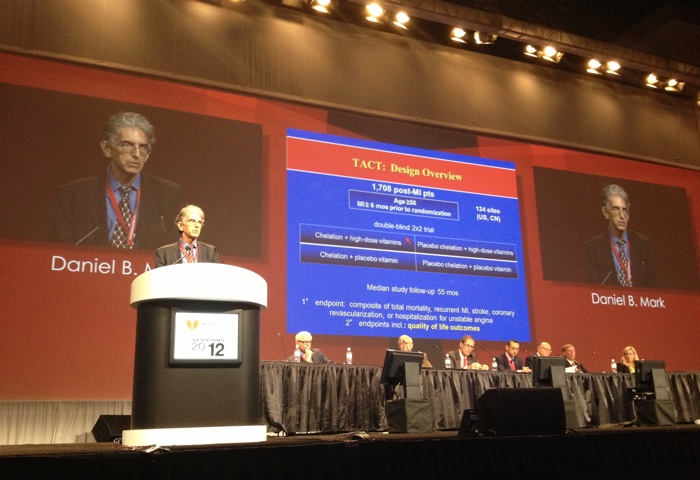TACT
Trial to Assess Chelation Therapy
ClinicalTrials.gov: NCT00044213
Patient Population:
- 1,708 post-MI patients
- 50 yrs or older
- MI 6 months or more prior to randomization
Trial Design: Double-blind, randomized, 2×2 factorial
Intervention: EDTA chelation therapy versus placebo in individuals with coronary artery disease
Primary Endpoint: Composite of total mortality, recurrent MI, stroke, coronary revascularization, or hospitalization for unstable angina
Sponsors: NIH, NHLBI, NCCAM
Quality of Life Substudy
Principal Investigator:
Daniel B. Mark, MD
Primary QOL Measures:
- Duke Activity Status Index
- MHI-5
Other QOL Measures:
- Seattle Angina Questionnaire
- SF-36
- EQ-5D
TACT: QUALITY OF LIFE STUDY
Overview
The specific aims of the Quality of Life substudy of the Trial to Assess Chelation Therapy are 1) to compare health-related quality of life for EDTA chelation versus placebo infusion and for high-dose vitamin and mineral supplements versus placebo by intention-to-treat and 2) to identify factors in addition to treatment assignment that are associated with variations in quality of life outcomes.
Results
Circ Cardiovasc Qual Outcomes. 2014 Jul;7(4):508-16.
Mark DB, Anstrom KJ, Clapp-Channing NE, Knight JD, Boineau R, Goertz C, Rozema TC, Liu DM, Nahin RL, Rosenberg Y, Drisko J, Lee KL, Lamas GA; TACT Investigators.
OPEN ACCESS from PubMed Central
Abstract
BACKGROUND:
The National Institutes of Health.funded Trial to Assess Chelation Therapy (TACT) randomized 1708 stablecoronary disease patients aged .50 years who were .6 months post.myocardial infarction (2003.2010) to 40 infusions ofa multicomponent EDTA chelation solution or placebo. Chelation reduced the primary composite end point of mortality,recurrent myocardial infarction, stroke, coronary revascularization, or hospitalization for angina (hazard ratio, 0.82; 95%confidence interval, 0.69.0.99; P=0.035).
METHODS AND RESULTS:
In a randomly selected subset of 911 patients, we prospectively collected a battery of quality-of-life(QOL) instruments at baseline and at 6, 12, and 24 months after randomization. The prespecified primary QOL measures were the Duke Activity Status Index (Table I in the Data Supplement) and the Medical Outcomes Study Short-Form 36 Mental Health Inventory-5. All comparisons were by intention to treat. Baseline clinical and QOL variables were well balanced in the 451 patients randomized to chelation and in the 460 patients randomized to placebo. The Duke Activity Status Index improved in both groups during the first 6 months of therapy, but we found no evidence for a treatment-related difference (mean difference [chelation.placebo] during follow-up, 0.9 [95% confidence interval, .0.7 to 2.6; P=0.27]).There was no statistically significant evidence of a treatment-related difference in the Mental Health Inventory-5 during follow-up (mean difference, 1.0; 95% confidence interval, .0.1 to 2.0; P=0.08). None of the secondary QOL measures showed a consistent treatment-related difference.
CONCLUSIONS:
In stable, predominantly asymptomatic coronary disease patients with a history of myocardial infarction,EDTA chelation therapy did not have a detectable effect on QOL during 2 years of follow-up.
TACT Publications
Heavy Metals, Cardiovascular Disease, and the Unexpected Benefits of Chelation Therapy.
Lamas GA, Navas-Acien A, Mark DB, Lee KL.
J Am Coll Cardiol. 2016 May 24;67(20):2411-8. doi: 10.1016/j.jacc.2016.02.066. Review.
PMID: 27199065 Free Article
Mark DB, Anstrom KJ, Clapp-Channing NE, Knight JD, Boineau R, Goertz C, Rozema TC, Liu DM, Nahin RL, Rosenberg Y, Drisko J, Lee KL, Lamas GA; TACT Investigators..
Circ Cardiovasc Qual Outcomes. 2014 Jul;7(4):508-16.
PMID: 24987051 Free PMC Article
Oral high-dose multivitamins and minerals after myocardial infarction: a randomized trial.
Lamas GA, Boineau R, Goertz C, Mark DB, Rosenberg Y, Stylianou M, Rozema T, Nahin RL, Lindblad L, Lewis EF, Drisko J, Lee KL; TACT (Trial to Assess Chelation Therapy) Investigators..
Ann Intern Med. 2013 Dec 17;159(12):797-805.
PMID: 24490264 Free PMC Article
Escolar E, Lamas GA, Mark DB, Boineau R, Goertz C, Rosenberg Y, Nahin RL, Ouyang P, Rozema T, Magaziner A, Nahas R, Lewis EF, Lindblad L, Lee KL.
Circ Cardiovasc Qual Outcomes. 2014 Jan;7(1):15-24. doi: 10.1161/CIRCOUTCOMES.113.000663.
PMID: 24254885 Free PMC Article
Lamas GA, Goertz C, Boineau R, Mark DB, Rozema T, Nahin RL, Lindblad L, Lewis EF, Drisko J, Lee KL; TACT Investigators..
JAMA. 2013 Mar 27;309(12):1241-50. doi: 10.1001/jama.2013.2107.
PMID: 23532240 Free PMC Article
Design of the Trial to Assess Chelation Therapy (TACT).
Lamas GA, Goertz C, Boineau R, Mark DB, Rozema T, Nahin RL, Drisko JA, Lee KL.
Am Heart J. 2012 Jan;163(1):7-12. doi: 10.1016/j.ahj.2011.10.002.
PMID: 22172430 Free PMC Article
Quality of Life Substudy – Late Breaking Clinical Trial
AHA 2012
November 4, 2012
American Heart Association Annual Scientific Sessions
Los Angeles, California, USA
Dr. Mark presents preliminary results of the quality of life substudy.
AHA LBCT Slides
Dr. Mark presented the preliminary TACT Quality of Life study results at the 2012 American Heart Association Scientific Sessions as a Late Breaking Clinical Trials abstract.
DCRI Research Conference
April 9, 2013
Durham, North Carolina, USA
Dr. Mark and Dr. Kerry Lee provide key insights into the inner workings of the trial.
